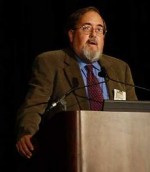Design dilemma

The only thing advocates of intelligent design are looking for is a crowd with an open ear and scientific legitimacy. Now they have spread their word a little further.
“I’d like to call this discussion scientific,” Tom Woodward said at the beginning of the “Darwin or Design?” conference held at the USF Sun Dome on Friday night. “So whether you are on one side of the argument or the other, honesty, science, good skepticism, pointed questions (and) maybe not nasty questions are welcome.”
Featured speakers Jonathan Wells and Michael Behe headlined the conference, sponsored by the Physicians and Surgeons for Scientific Integrity, speaking to an audience of more than 1,000 attendees. The crowd was largely composed of non-USF students wearing clothing reflecting their Christian beliefs.
The essential point of the conference was to inform the audience that intelligent design does not completely disagree with the changing and evolving of species. Theorists only discount the Darwinian interpretation of how species evolve.
“Darwinism isn’t even much of a theory,” said William Dembski, a leading theorist in intelligent design. “It’s more a Victorian standard that has been handed down through generations. Intelligent design comes in and gives us a truly scientific explanation of origins.”
Each speech given was followed by a 20-minute question-and-answer session between the audience and the speakers.
Wells, a cell and developmental biologist, began his speech by explaining the similarities between Darwinism and intelligent design.
“For Charles Darwin himself, his theory was that all living things are a descendant with modification from an original ancestor through unguided, natural processes,” Wells said.
Wells said he agreed with other intelligent design theorists who believe species change over time. According to Wells, they disagree with Darwinian theory over the development process of a species as being unguided, but rather directed by a designer. The development process of the species would be guided by this designer, he said.
“We often hear from Darwin defenders that evidence of Darwinism is ‘overwhelming,'” Wells said while displaying a figure of automobiles on the projector screen, shown as an example of Darwinian macroevolution. “What is overwhelmingly obvious is that these automobiles were designed,” Wells said, causing a roar of laughter throughout the crowd.
“Until we have evidence that the mechanism by which one species can turn into another, we have to doubt Darwin’s theory,” Wells said in response to a question from an audience member.
The evening’s second featured speaker was Behe, a biochemist and professor who has studied biochemistry and evolution for 23 years.
“Darwin’s theory does not account for what we have found on the molecular level of life,” Behe said after being announced as the leading voice of intelligent design theory.
“Irreducible complexity can be applied to non-biological things, like a mouse trap. For the mousetrap to effectively work, all individual parts must be working in order for the trap to perform its task. The same idea can be applied to biology,” Behe said. “There are about 40 protein parts that are necessary for this biological machine – the cell – to work. If any are missing, then you either get a flagellum that doesn’t work, or it doesn’t even get built within the cell.”
Audience response from the speakers was varied.
“I believe in creationism,” one member of the audience said. “It’s written in the Bible, and the Lord said it, so I believe it must be so. I appreciate that there are people trying to get the real answers.”
Some audience members were more skeptical, however.
“I thought they had a good argument,” sophomore chemistry major John Keil said. “But their explanation cannot be proven. I’m still a believer in Darwin’s theory of natural selection.”






